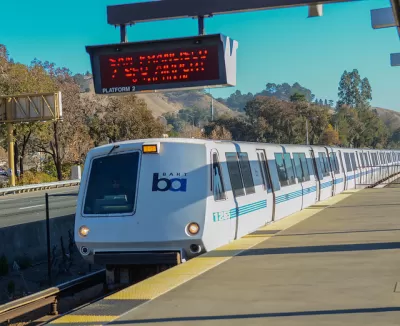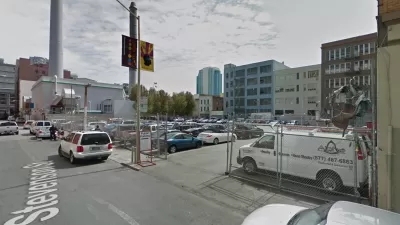Planetizen has been tracking the development proposal for the Terraces of Lafayette in California since 2015. The saga isn't over yet.

"After years of debate and litigation, the fate of a contentious 315-unit housing plan known as the Terraces of Lafayette may finally be headed for a decision," reports Jon Kawamoto.
Before the Coronavirus pandemic led to widespread cancellations of public meetings—at the municipal, regional, and state levels around the country—the Lafayette Planning Commission had scheduled the a meeting to discuss the plan on April 6, 2020.
The Terraces of Lafayette project has been the subject of close scrutiny for years. In 2015, the city approved the city for 44 houses instead of the originally planned 315 units, eventually launching the "Sue the Suburbs" movement intended to force cities in the Bay Area to build more housing. The example of the project has been frequently cited as the inspiration for new laws strengthening the state's Housing Accountability Act.
"The Terraces has been the subject of 20 public hearings since it was first proposed in March 2011," according to Kawamoto. "But a new housing law, Senate Bill 330 by state Sen. Nancy Skinner, D-Oakland, limits the number of public hearings to five for new applications." Since the law took effect, one hearing was already conducted for the proposal, so the total is now down to four.
But the hearing limitation isn't the only way SB 330 is impacting the project. The law probably prevents the city from holding a ballot initiative to overturn the project, if approved. Still, a spokesperson for the project's developers expects appeals to continue to delay the project.
FULL STORY: Fate of Lafayette’s big housing plan may be determined soon

Study: Maui’s Plan to Convert Vacation Rentals to Long-Term Housing Could Cause Nearly $1 Billion Economic Loss
The plan would reduce visitor accommodation by 25,% resulting in 1,900 jobs lost.

Alabama: Trump Terminates Settlements for Black Communities Harmed By Raw Sewage
Trump deemed the landmark civil rights agreement “illegal DEI and environmental justice policy.”

Why Should We Subsidize Public Transportation?
Many public transit agencies face financial stress due to rising costs, declining fare revenue, and declining subsidies. Transit advocates must provide a strong business case for increasing public transit funding.

Paris Bike Boom Leads to Steep Drop in Air Pollution
The French city’s air quality has improved dramatically in the past 20 years, coinciding with a growth in cycling.

Why Housing Costs More to Build in California Than in Texas
Hard costs like labor and materials combined with ‘soft’ costs such as permitting make building in the San Francisco Bay Area almost three times as costly as in Texas cities.

San Diego County Sees a Rise in Urban Coyotes
San Diego County experiences a rise in urban coyotes, as sightings become prevalent throughout its urban neighbourhoods and surrounding areas.
Urban Design for Planners 1: Software Tools
This six-course series explores essential urban design concepts using open source software and equips planners with the tools they need to participate fully in the urban design process.
Planning for Universal Design
Learn the tools for implementing Universal Design in planning regulations.
Smith Gee Studio
Alamo Area Metropolitan Planning Organization
City of Santa Clarita
Institute for Housing and Urban Development Studies (IHS)
City of Grandview
Harvard GSD Executive Education
Toledo-Lucas County Plan Commissions
Salt Lake City
NYU Wagner Graduate School of Public Service





























